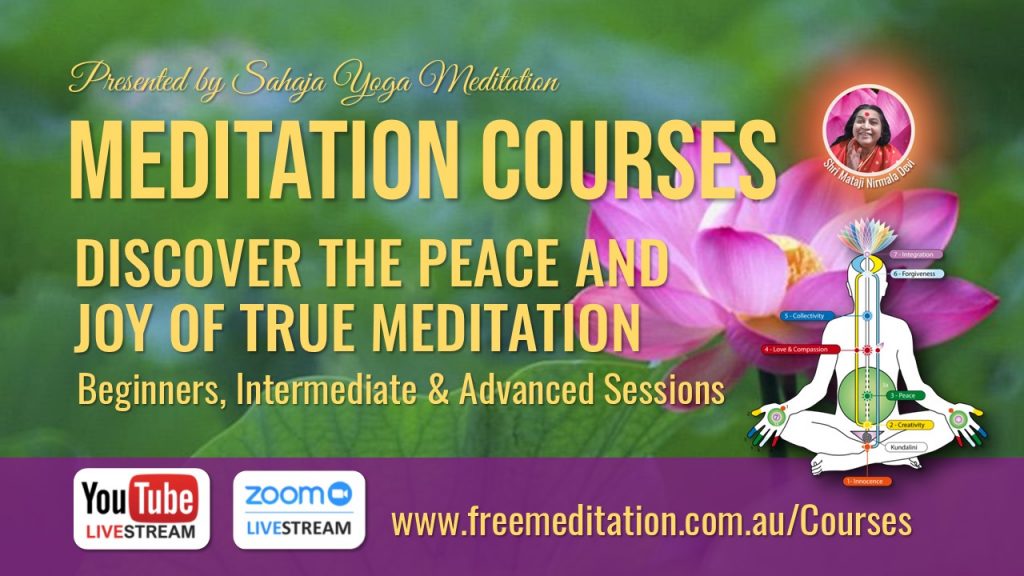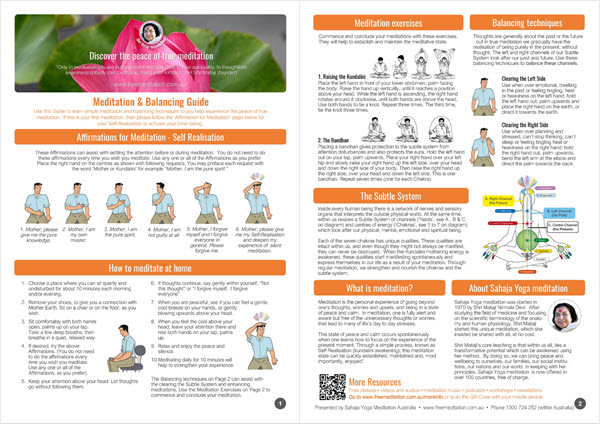Welcome!
Thank you for starting your Sahaja Yoga meditation journey with us.
On this page, you’ll find information and resources to help you with your journey.
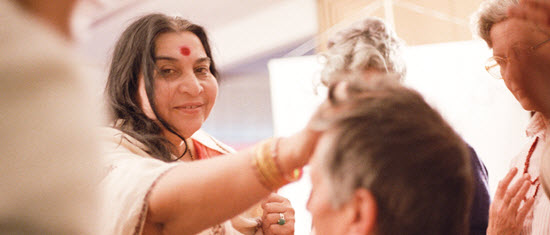
H.H. Shri Mataji – founder of Sahaja Yoga Meditation
We are members of a community based group of volunteers who offer the public free meditation in-person classes and online sessions on YouTube, Facebook and Zoom.
Our meditation is called Sahaja Yoga meditation which was founded by Her Holiness Shri Mataji Nirmala Devi in 1970. We don’t charge for the teaching of Her meditation, as this was Shri Mataji’s guiding principles for all those who wish to teach and practise Her meditation.
[More about Shri Mataji]
Sahaja Yoga meditation is now practised is over 100 countries and millions of people have experienced Shri Mataji’s meditation over the past 50 years.
[Worldwide centres]
All operating expenses such as venue hire, advertising and online presence are funded by the generous support of our members. There are no paid positions in our worldwide organisation.
Collective meditation sessions with clearing, balancing, talks and discussions on a topic of the day. Suitable for complete beginners and regular mediators. Zoom sessions are interactive so you’ll be able to chat privately with our presenters if you have any questions.
Our Courses
Our current Courses and recordings of previous sessions.
- Call with WhatsApp +61 410 177 822
- Within Australia, call us on 1300 724 252
- Email: [email protected]
- Join our latest Course WhatsApp group.
- Worldwide centres in over 100 Countries.
- Register your details for the latest online events.
Resources
There’s a lot of information here, so please keep in touch with us during the course as you work your way through the material below.
Sahaja Yoga Meditation & Self Realisation
“You cannot know the meaning of your life until you are connected to the Power that created you.”
HH Shri Mataji Nirmala Devi – Founder of Sahaja Yoga Meditation
Your Self Realisation
Through our Sahaja Yoga meditation sessions, everyone receives their Self Realisation. Self-Realisation occurs when the Kundalini, a mothering energy within all of us, is awakened and connects us to the all-pervading power.
Meditation
Through regular meditation, we strengthen our Kundalini to cleanse and balance our energy centres (chakras). Meditation allows us to go beyond our thoughts (thoughtless awareness) to experience inner peace and silence. Regular meditation only takes a few minutes and really works!
Try the meditation
Sit quietly for a few moments and hold out your hands, palms upward, towards the photograph. You may feel a cool or warm breeze and your thoughts may quieten. Continue meditating in silence for 5 to 10 minutes.
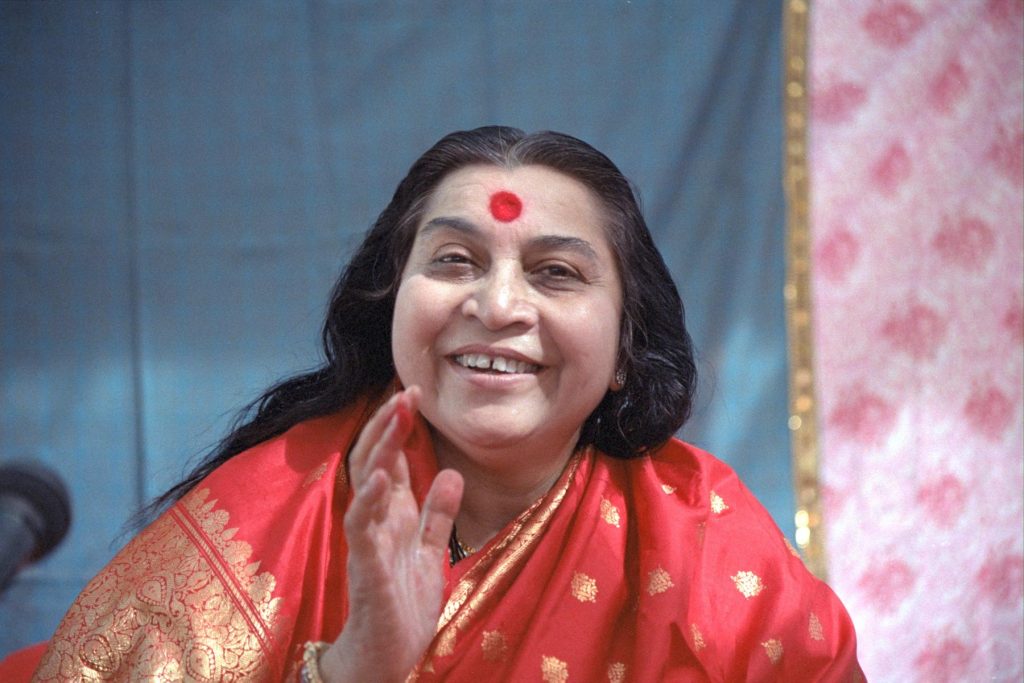
HH Shri Mataji Nirmala Devi
About Sahaja Yoga Meditation
True meditation is a personal experience, where one goes beyond thoughts, worries, and upsets. One is calm and peaceful through ‘thoughtless awareness’- that is, no unwanted thoughts but fully aware. Sahaja Yoga meditation is used by millions globally, with minimal disruption to daily routines, to actually achieve inner balance, joy and improvements in mental, physical, emotional and spiritual well-being.
Sahaja, Saha means ‘with’, Ja means ‘born’. Born with you. That is spontaneous. Yoga means Union with the Divine. So, Sahaja Yoga is the spontaneous union of your Self with the Divine.
Who is Shri Mataji?
Shri Mataji Nirmala Devi (or ‘Mother’, as she is affectionately known) founded Sahaja Yoga meditation in 1970. For over 40 years, she gave thousands of lectures and taught millions around the world how to meditate easily. Born in 1923 in India, she worked with Mahatma Gandhi and was very involved in India’s fight for independence. She was a mother and grandmother and a descendant of an Indian royal family.
The Subtle System
Overlaying our nervous system, resides a subtle system comprising of energy channels (‘Nadis’, see A to C on diagram) and centres of energy (‘Chakras’, see 1 to 7 on diagram). This system looks after our physical, mental, emotional, and spiritual being. Upon ‘Self Realisation’, our spirit is awakened, and the subtle system connects to the all-pervading life force that nourishes and balances it through true meditation.
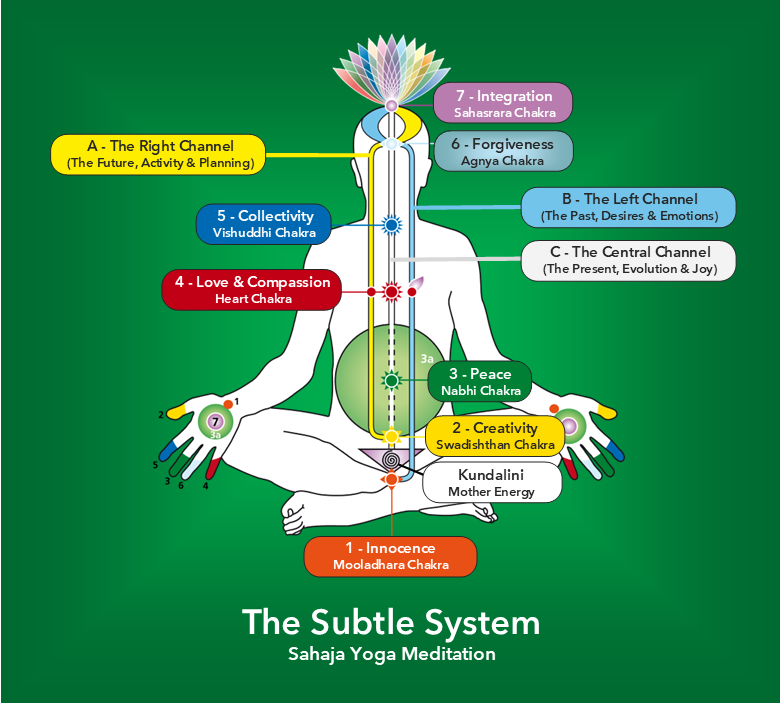
The Subtle System
How do I learn more?
To help you understand this new experience, you are invited to free online courses or weekly classes where collective meditations will establish your Self Realisation. You will learn how to maintain inner balance throughout the day and read and correct any imbalances in your subtle system. Classes are held in over 100 countries worldwide. Suitable for newcomers and regular meditators. No booking needed and everything is provided. Classes are always free of charge.
More Information & Online Resources
Online resources with video and audio meditations, meditative music, balancing techniques, printed guides and talks by Shri Mataji (founder). Live Streaming meditation webcasts. Podcasts with guided meditations, music and talks. Newsletter sign up for news and events.
Use this Guide to learn simple meditation and balancing techniques to help you experience the peace of true meditation. If this is your first meditation, then please follow the ‘Affirmation for Meditation’ steps for your Self-Realisation to activate your inner-being.
Music
Ragas/Songs for the Chakras
Selection of Ragas (Songs with mantras) which are a melodic mode of Indian classical music that focus on each chakra of the Subtle System. Listening to the music can help to clear the chakras when meditating.
- Raga for Mooladhara Chakra
- Raga for Swadistan Chakra
- Raga for Nabhi Chakra
- Raga for Void area
- Raga for Left Heart Chakra
- Raga for Center Heart Chakra
- Raga for Vishuddhi Chakra
- Raga for Agnya Chakra
- Raga for Sahastrara Chakra
Meditation music with Didgeridoo instrument.
The didgeridoo is a wind instrument, played with continuously vibrating lips to produce a continuous drone while using a special breathing technique called circular breathing. The didgeridoo was developed by Aboriginal peoples of northern Australia at least 1,500 years ago, and is now in use around the world, though still most strongly associated with Indigenous Australian music.
The Didgeridoo represents the earthy sounds of the Mooladhara chakra which is located at the base of the spine. The chakra has the qualities of innocence and wisdom and manifests in Uluru (Ayers Rock) located in central Australia. The Mooladhara chakra is symbolized by the elephant headed child – Shri Ganesha.
All this music is performed by musicians who practice Sahaja Yoga meditation.
- Omkara Pradhana (Marathi)
- Shri Ganesha Kinaryala Lau (Marathi)
- Invocation To Shri Ganesha
- Tujhacha Mataji Pare
- Namaste Ganapataye
- Ganesha Mantra (Traditional)
Devotional music
Beautiful devotional music in praise of our inner Mother and the external Spirit. Sung by Anandita Basu who is a recognised name in Sahaja music, Sufi and Qawwali music from Kolkata, India. Anandita started to learn Indian Classical music at the age of 4 with her mother and Guru, Professor Anjana Basu.
- Anyatha Sharanam - Thou art my sole refuge
- Sheetal Komal Nirmal - Blessings of the Mother Kundalini,
- Atma Ashtakam - The Light of our Spirit
- Shri Mataji Ke Charano Me - I surrender to my Mother Kundalini
- Shri Durga Chalisa - Giver of Confidence
- O Lal Meri - Oh Lord,my honour
Vishwa Shanthi – Universal Silence
A presentation from the Late P.K. Salve Academy of Music and Fine Arts in India.
Sahaja Yogis from around the world attended the Academy to harness their Self Realisation to learn and develop their artistic skills. While at the academy, they produced this beautiful music that is influenced by western and traditional Indian styles.
- Vishwa Shanthi - Universal Silence - 01 - Universal Silence
- Vishwa Shanthi - Universal Silence - 02 - Calling Out
- Vishwa Shanthi - Universal Silence - 03 - Touching Your Heart
- Vishwa Shanthi - Universal Silence - 04 - Freedom Ride
- Vishwa Shanthi - Universal Silence - 05 - Cada Dia un Poca Mas
- Vishwa Shanthi - Universal Silence - 06 - The Majesty of the King
- Vishwa Shanthi - Universal Silence - 07 - Tidal Wave of Love
- Vishwa Shanthi - Universal Silence - 08 - Vande Mataram
- More meditation music – Selection of music to enhance the meditation experience.
Audio and video podcasts
Our podcasts provide listeners with guided meditations, guest speakers, music and more details about the Sahaja Yoga meditation technique. There’s also an opportunity to hear a talk by Shri Mataji (founder).
People tell us how much they enjoy the depth of ‘collective’ meditation when they attend online and weekly classes. But for the times when it’s just not possible to attend, there are podcasts!
Listen to a selection of our podcasts on your mobile device, tablet or desktop.
Audio podcasts
Video podcasts
Free meditation classes and resources to help you discover the unique technique of Sahaja Yoga Meditation.
Resources
- Resources area – Subtle system/chakras, Glossary of Terms, printed guides, meditative music, video and audio meditations, balancing techniques and talks by Shri Mataji (founder).
- More about Sahaja Yoga – What is Meditation? Who can do meditation? What does it cost? Who teaches the meditation? Who teaches the meditation? Getting started.
- More about Shri Mataji – Founder of Sahaja Yoga meditation. Shri Mataji quietly transformed lives. For more than forty years, she travelled internationally, offering free public lectures and the experience of self-realization to all, regardless of race, religion or circumstance.
- Nirmala Vidya Amruta – References to all of Shri Mataji’s talks if you want to look up a particular ailment/issue and find out Shri Mataji’s solutions to it.
- Meditation music – Selection of music to enhance the meditation experience.
- Resources for children – Sahaja Yogi parents who are trying to make meditation for children different and interesting for them. (Password to website is Gananayaka)
- Online daily meditations on YouTube, Facebook and Zoom.
- Audio podcast website – On Apple podcast – On Google podcast.
- Video podcast website – On Apple podcast.
- Sahaja Yogis Experiences – Sahaja Yogis share their experiences, re-collections of memories and encounters with Shri Mataji and the practice of Sahaja Yoga. Find out about Shri Mataji’s life, and enjoy pictures taken over more than three decades in five continents.
- Australian classes – in over 80 locations.
- Worldwide centres – in over 100 countries.
- Subscribe to Newsletter. – To be notified of online events, workshops and other events.
- Contact Us – If you have any questions about our meditation then please don’t hesitate to contact us.
While participating in our sessions, you will come across several terms that may be new to you. This is an overview of the most commonly used terms…
All Pervading Power
God Almighty. Known by many names including Shiva, Allah and Yaweh.
Attention
The faculty of applying the mind and interest. Under pressure it can become short-spanned and undisciplined but through Sahaja Yoga Meditation the faculty can become focused and productive.
Balancing and Clearing
If the attention is majorly focused on right-sided activities (thinking, action, the future) or left side (reflection, emotion, the past) blockages can occur. Meditative clearing removes these blockages and allows the system to gain balance in the centre (mental silence, peace, now).
Catches
Catches occur when the efficient function of chakras is impaired. These catches block the passage of kundalini and are the causes of varying problems. When these damaged charkras are repaired through meditation the problems disappear.
Central Channel
This is the channel through which the kundalini flows. It is opened when self realisation takes place and it is the through-flow of kundalini which brings about real and enriching meditation.
Chakras
These are the subtle energy centres located at the main nerve plexuses along the spine. There are seven main chakras in the human system and they relate to stages of evolution, the seventh, at the top of the head being activated by self realisation.
Cool Breeze
The energy manifested from the top of the head when self realisation takes place. It can be felt as a warmish breeze-like sensation. After meditation the energy cools down and is known as the cool breeze.
Difference between Yoga and Meditation
Yoga is the union of the kundalini with the great energy of creation that surrounds us (self realisation). Meditation takes place as a result of that joining.
Guru
Spiritual teacher, guide. Someone with their self realisation who assists others to gain their yoga.
Kundalini
The mothering energy that resides in the sacrum bone at the base of the spine. When self realisation takes place this energy uncoils, rising through the chakras and the top of the head.
Inner Peace
Being free from mental activity. Not being concerned with memory or plans but being in the ‘now’.
Joy
Happens when deep meditation takes place. A all-embracing sense of relaxed well-being.
Kundalini Awakening
Kundalini resides in three-and-a-half coils at the base of the spine. When self realisation or kundalini awakening takes place, this energy uncoils and rises through the chakras to manifest at the top on the head.
Left Channel
This rises along the left side of the spine but at the forehead it crosses into the right hemisphere of the brain to become the superego. It is concerned with emotion, the past, insecurity, conditioning and, if the attention becomes heavily focused into it, it can cause depression and many painful diseases.
Meditation
It is a state of relaxation without mental activity. It is calming, peaceful and opens the inner pathways to health, knowledge and spiritual deepening.
Right Channel
This rises along the right side of the spine but at the forehead crosses into the left hemisphere of the brain to become the ego. It is concerned with action, the future, planning and, if the attention becomes heavily focused into it, it can cause anger, tensions and many painless diseases.
Sahaja Yoga Meditation
The word ‘Sahaja’ in Sanskrit has two components: ‘Saha’ is ‘with’ and ‘ja’ is ‘born’ – the literal translation is “innate”. Yoga means union with the divine. So, Sahaja Yoga means spontaneous and born with you meaning that the kundalini is born within us and can be awakened spontaneously, without effort. This is Self Realisation
Self Realisation
This is the yoga, the union, the joining of the individual spirit with the great energy of creation. It happens when the kundalini (life force) rises from its home in the sacrum bone along the spine and pierces the fontanelle at the top of the head.
Shri Mataji
The founder of Sahaja Yoga. She was born in 1923 in Chhindwara, India. Her father was a lawyer who spoke fourteen languages and was the first Christian Member of the Indian Parliament. Her mother was the first woman in India to receive an honours degree in mathematics. The family was deeply involved in the Indian fight for independence. Shri Mataji married C.P. Shrivastava, a diplomat who became Secretary General of the UN Maritime Organisation. She has two daughters and four grandchildren. In 1970 she discovered a way of granting spontaneous self realisation. She then travelled the world holding programs, giving self realisation and informing people of Sahaja Yoga.
Spirit
The reflection of divinity within each human subtle energy system.
Spirituality
An intense interest in the non-material aspects of life, reality and existence after death
Subtle System
The network of chakras, channels and kundalini which define the nature of a human being at any given time. (See more here)
Thoughtless Awareness
Is meditation. All thinking stops although the consciousness of sounds around us remains. The traditional name for this very pleasant and rewarding state is mental silence.
Vibrations
The cool pulsing that a realised person feels (often on the palms of the hand) when the attention is focused on something or someone in balance.
Yoga
The pathway to, and gaining of, self realisation. Rajah Yoga is the pathway along the right channel, Bakthi Yoga uses the left channel ‘Sahaja means born-with or spontaneous. So Sahaja Yoga draws attention to the fact that the union (self realisation) can be gained spontaneously by way of mechanisms one is born with.
Videos

2 Minute Meditation
This moment is going to transform your life. Shri Mataji guides you through a simple meditation step to experience inner silence.

Self Realisation
Self Realization is the process of awakening the Kundalini within an individual. Everyone has the capacity to receive their Self Realisation.

Importance of Meditation
“Meditation is such a soothing thing, such a beautiful way of connection with the Divine, that all your problems get solved in that meditative mood.” Shri Mataji Nirmala Devi


